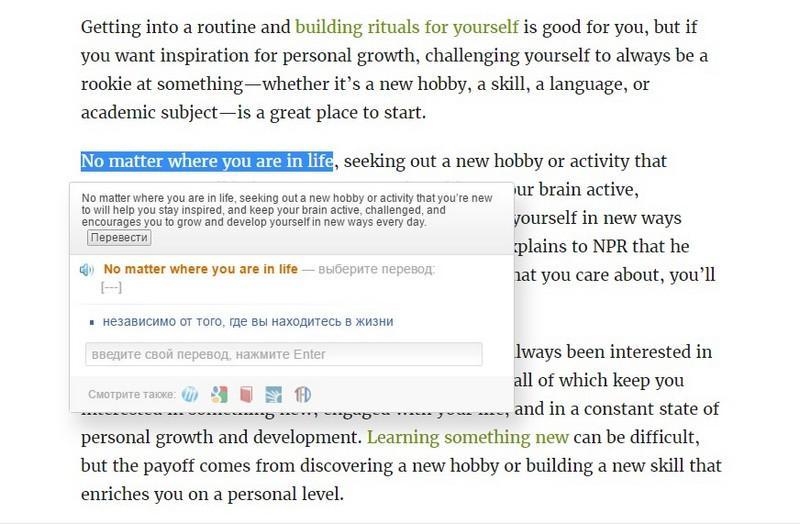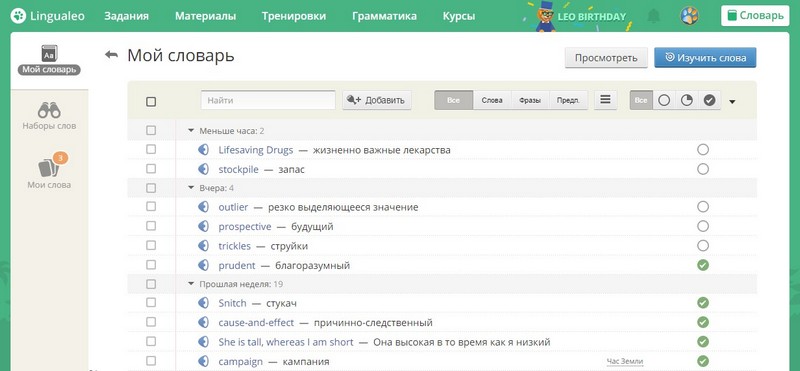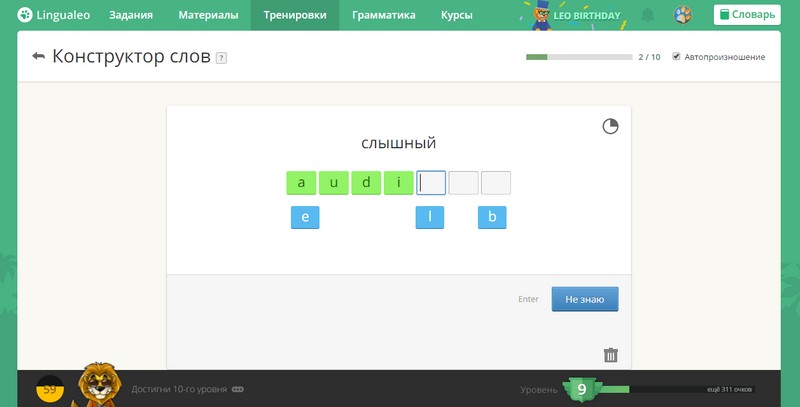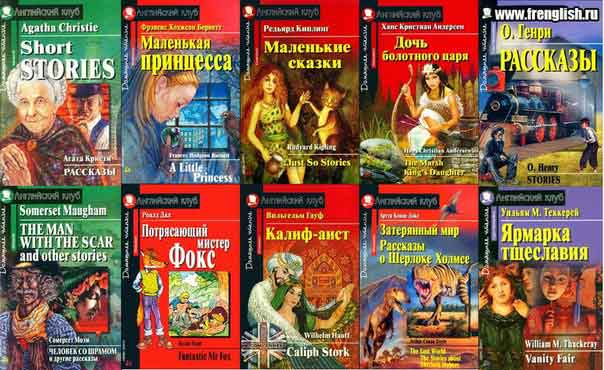We learn a language in order to use it. Reading and listening are the channels through which we perceive language, its words and constructions in a living, not schematic, embodiment, enrich vocabulary, getting used to the language.
From this article you will learn how to expand your vocabulary, develop reading skills, improve your general knowledge of the language by reading English-language sites using a special dictionary Lingvaleo.
A large vocabulary is the result of reading
Of the four types of speech activities (reading, listening, writing, speaking), reading is the easiest. Many people complain that they cannot speak or understand by ear, but learning to read simple texts is much easier. To do this, you don’t need to practice speaking and pass gigabytes of audio recordings through your ears.
However, regular reading is the best source of vocabulary development. The text, as a rule, is “smarter” than spontaneous oral speech and, on average, more complex in terms of vocabulary and grammar (however, it does not require listening skills). As linguist Jeff McWillan (University of Southern California) noted, “Years of research have shown that a large vocabulary is almost always the result of extensive reading (in other words, reading large amounts of material).”
According to Wikipedia, the share of the English-language Internet is 53.9% (Russian-language 6.2%). At the same time, it’s no secret that many successful Russian-language Internet projects “drew inspiration” from English-language sites.
- Sites designed for English learners, for example, Wikipedia in simplified English (there is a separate one about it).
- Online magazines like lifehacker.com. In such publications it is not customary to write too intricately.
- Personal and “niche” blogs dedicated to a specific topic. As a rule, they are conducted in an informal tone, even if they are devoted to business issues. On the English-language Internet you can find sites dedicated to anything.
- Materials in the specialty, hobby, as there is a special interest in them.
- , discussions and retellings of films, TV series (on sites dedicated to these films, TV series).
- News, because there is a rather dry newspaper language, but this is a matter of habit. After reading the news for some time English, you will get used to their patterned turns and language features.
- Fiction. The most famous free online library is Project Gutenberg.
For example, my knowledge of English was very useful when I read drawing guides on sites for beginning artists (I have such a hobby), when I studied the issues of website building, blogging, and, of course, in search different materials in English for this site. In general, it is very convenient to know English. I went to a foreign site, and everything is clear there :)
The difficulty of a text is relative. If the text is on a topic that really interests you, you will successfully digest it in any case.
LinguaLeo Library - read in English and learn words
If we don’t take websites in general, but specifically English teaching websites, then it’s very convenient to read on.
In general, LinguaLeo has a lot of possibilities: there are videos, audio recordings in English, various courses - you can read about this in. Now I want to especially focus on the fact that there is very convenient reading functionality plus a large collection of different texts.
The convenience is that you can see the translation of an unfamiliar word or sentence by clicking on it with the mouse. These words are sent to a personal dictionary, where they can later be repeated. In the text, words with the status “studied” are highlighted in yellow.
These words can be learned later through exercises. Since the texts are mostly short and simple, this is a great way for beginners to expand their vocabulary and develop reading skills.
How to read in English using the Lingvaleo dictionary
Lingvaleo has a very convenient one, which, with a reasonable approach, will help you make significant progress in reading English, expand your vocabulary, and learn useful expressions.
By installing this extension, you will be able to translate english words with a click of the mouse, without being distracted from reading. Several translation options will appear in the pop-up window (you can add your own), and you can also listen to the pronunciation. Many words have association pictures added to them.

The word appears with translation options, voiceover and picture. Shot from bodybuilding.com
Which is very convenient the word is stored along with the context- a phrase or a small passage of text from which it is taken. This is very important for memorizing a word, and indeed for understanding its meaning.
Phrases and even entire sentences can also be highlighted and translated. The translation is automatic and, in the case of long sentences, not of very high quality, “Google Translate” - it can be corrected manually.

Phrases, like words, are stored with context. Shot from lifehacker.com
If you use Lingualeo for free, you will need to pay for each added word with a meatball, the in-game currency. Meatballs are earned by completing exercises and even in free mode there is no shortage of them. If you buy “Golden Status” (paid subscription), words can be added without restrictions.
Is it worth saving all the unfamiliar words?
The convenience of the Lingvaleo dictionary is that it allows you to find, translate and save (with context) a word as quickly as possible. Much faster than with paper or even something like Lingvo or Multitran. That is, it is ideal for reading English-language sites.
But still, you shouldn’t be distracted by the dictionary so often that it interferes with reading. I think that when reading, you should save only words that are really important for understanding the text, as well as words and phrases that may be useful to you. Minor details can be missed, especially if there are a lot of them and you have to constantly be distracted to find all the words.
How to learn words and phrases written out during reading?
Words translated using the Lingvaleo dictionary do not go anywhere, but are stored in your dictionary on . They can be repeated and taught using the extensive capabilities of this site.

By clicking on the “Learn words” button you will proceed to selecting an exercise
Eight learning modes are offered for repetition and memorization of words:
- Translation-word— words are shown in Russian, you need to select correct option in English.
- Word translation— words in English, answer options in Russian.
- Listening- you need to write words under dictation in English.
- Leo sprint- you are shown a card with a word or translation, you need to answer whether the translation is correct or not, the task is completed for a time (therefore a “sprint”).
- Word constructor— the translation of the word must be composed of squares with letters (or simply typed).
- Crossword- the name speaks for itself.
- Vocabulary cards— double-sided cards for memorizing words.
- Phrase builder- making phrases from words.

Task in the word constructor
“Listening” and “Crossword” modes are available only with “Golden status” (paid subscription). Also, to unlock some modes you need to level up to a certain level by completing tasks.
How exactly to learn the written words - so that they bounce off your teeth, or just repeat them - is up to you. But I can offer options. Let's say 50 words have accumulated in a day. Here's what you can do with them:
- Don’t learn words at all, just review them and refresh your memory. If you remember something, good. If not, well, okay.
- Look through the words and repeat with easy exercises, for example, “Leo-Sprint” or “Word-translation”.
- Choose a few really useful cards and learn them well, review the rest or repeat them fluently.
- Learn all the words by heart, and then repeat them from time to time to consolidate them in your memory.
Even if you choose the first option, the benefits will be significant.
On Lingvaleo, in addition to words added via a browser plugin, you can add ready-made kits. There are more than 500 collections to choose from on various topics.
These ready-made kits may come in handy. However, it is much more effective to repeat words you have written down yourself while reading interesting material. They are not taken from nowhere, but represent something like a summary - they evoke associations and help remember the content of the text.
Conclusion
On foreign sites you can find a lot of interesting and useful information. If you already have a certain base of vocabulary and understanding of grammar, allowing you to read in English, understanding at least the main part of the text, consider visiting English-language sites more often. Perhaps you will find something there that is not in Russian. By regularly reading interesting and moderately difficult materials, you will gradually increase your vocabulary and develop reading skills. The more you read, the easier it becomes to read. With the help of a convenient dictionary, you can significantly simplify the reading process, as well as learn the written words.
At first glance, reading in English seems like a dense forest. But this impression is deceptive. There are certain rules for the pronunciation of a particular sound that are quickly remembered and easily reproduced. How to overcome this thorny path faster and easier?
Learning any language begins with familiarization with the letter and sound systems, with transcription. English words are read by certain rules which can be divided into two groups: reading consonants + their letter combinations and reading vowels + their combination with other letters.
Rules for reading consonants in English
Before learning to read, let's get acquainted with some features of consonants. All sounds of this group are divided into voiced And deaf. Each of them is pronounced energetically, intensely, abruptly.
Such as [p], [t], [k] are accompanied by aspiration, [n], [d], [l], [z], [s], [t] differ from Russian in the place of articulation: with the tip of the tongue we touch alveoli (tubercles above the upper teeth). Try pronouncing Russian and English sounds alternately, and you will notice the difference. It is this feature (alveolar sounds, as they are called in phonetic science) that distinguishes English speech. It is important to note that English consonants are not softened or devoiced at the end. Let's get to know transcription of sounds.
[b] – like Russian “b”, [p] – “p”, but with aspiration;
[f] – “f”, [v] – “v”;
[w] – similar to the Russian “uo”, pronounced only with the lips;
[t] and [d] - end of the tongue on the alveoli (see above);
[k] - “k”, [g] – “g”;
[n] – “n”, [ŋ] – the sound seems to come out through the nose, a mixture of “n” and “g”;
[s] – “s”, [z] – “z”;
[ʒ] – “zh”, – “j”;
[ʃ] – “sh”, – “h”;
[θ] – deaf, we bite the tongue a little with our teeth. A little close to Russian “s” and “f”;
[ð] – also interdental, but voiced. Try biting your tongue a little and pronouncing the Russian “z”.
[r] - “p”, [l] - “l”;
[h] - “x”, only lighter, like an exhalation, almost inaudible;
[j] – “th”, air through the nose.
How to correctly read consonant combinations in English?
1. bt at the end of the word there is only [t]: debt, doubt.
2.Cc has 3 reading options: [s] before e, i and y: face, city, cycle. In the rest it is pronounced as [k]: cat, cry, come. In letter combinations "cial" like [ʃƏl]: social, special, "cient" - [ʃent]: ancient. When combined "cc" or [k]: the first sound is pronounced before e, i and y: accept, accident. The second in other cases: occupy, according, occasion. Letter combinations such as "ch" And "tch" , standing together in a word, are read as ]: chess, much, cheese. But "ch" pronounced like [k] in Greek words: school, chemistry, character, and like [ʃ] in French: machine, machinist.
3. Letter d [-] – before consonants: grandmother, handsome. Combination "dg" - : bridge, knowledge.
4. The rules for reading words in English state that the combination "ften" read as: often, soften.
5. Letter "Gg" before vowels e, i, y as , and in other cases as [g]. "gh"— [-]: bought, eight, but after "au, ou" read [f]: laugh, enough. At the beginning of a word or at the end "gn"- [n]: foreing.
6. The letter “k” drops out when reading a letter combination "kn" at the beginning of the word: knife, knee, know.
7. In combinations "alm, alf, alk," the letter “l” is not pronounced: talk, calm, half.
8. A in "mb, mn" at the end of the word only [m] is pronounced: autumn, climb.
9. "Ph" should be pronounced as [f]: phone, phrase.
10. Mysterious letter "s" has many exceptions. At the beginning of a word, before voiceless consonants, in combination ss- [s], and after voiced ones or between vowels as [z]. After voiceless consonants and before an unstressed syllable [ʃ], as well as in combination "sh": sugar, Russian, ship.
According to the rules of reading in English, the combinations "ssion" read as - [ʃn], "sion" - [ʒn], "sure" — [ʒ ə], "sten" — , "stle" — : discussion, decision, pleasure, listen, wrestling.
11. With a letter "t" It's easier to remember the rules than with the previous one: "th" - [θ] and [ð], "tion" - [ʃn], "ture" - : thing, this, dictation, picture.
12. "w" + h = [w]: when, why. But, "w" + h + o = [h]: who, whom, whole. And in combination "wr" pronounced as [r]: wrong, write.
13. Letter "Xx" pronounced in two ways, depending on its place in the word. So, at the end of a word or before consonants it should be read as : box, text. But before the stressed vowel : examination, example, exact.
IN english alphabet 6 vowels, the reading of which depends on the stressed and unstressed syllable, openness and closedness. You can read more in other articles.
As you can see, it is not enough to learn the alphabet. You can read English words correctly if you master the pronunciation of each sound and learn letter combinations. But you shouldn’t learn everything by heart at once. Gradually, better with practice: listen, pronounce only a single sound or combination in words, and then use mixed reading exercises.
Reading books in the original is one of the the best ways improve your English. Today we will talk about everyone important nuances learning English from books, and also tell you how to choose the right first book to read.
Perhaps you have already begun to practice reading literature, and even carefully noted unfamiliar words. But most likely, you were not enough for more than 10-20 pages of such reading. Well, that's right. This is not reading, but real torment! Today you will learn the effective and most competent option for learning English with the help of fiction books, which will help you train several skills at the same time, which gives you more good result than banal reading with a pencil and a dictionary.
How to choose a book to read in English?
Before you choose a book, you need to understand that the process should be enjoyable. Often, students of English with a low level of knowledge start reading unadapted classical literature. This cannot be done, since such reading will not give a positive result; rather, it may completely discourage the desire read books in English.
Who needs adapted books in English and is it worth reading them?

In principle, if your level is not lower than Pre-Intermediate, you can start reading adapted books (but in no case with parallel translation!). This will give you the opportunity to learn some basic phrases and words that are used in everyday life and everyday speech. Although there are exceptions.
In one of the adapted books, the word “monk” constantly appears, which can be heard extremely rarely in everyday speech.


If you do not want to read literature that is not appropriate for your age, you can find freely available retellings of original works made by native speakers from Cambridge English Readers. Among them there are books of all genres: from thrillers to classic works in a form that is easy to understand and study, without outdated expressions and constructions.
If you have an Intermediate level or higher, then you can take any book and, combining business with pleasure, learn English. But it is still advisable that the first few books you read in the original should be familiar to you (that is, take those works that you have previously read in your native language).
When choosing a book, it is advisable to do the following. Download the book of your choice to your computer and start reading one page (but not the first). Mark all unfamiliar words. If there are more than 30% of the total number of words on the page, then it’s too early for you to read such a book.
How to read books in English?
- First, read one chapter of the book. If the chapter is too long, break it into several parts. As you read, pay attention to word order and grammatical structures. When reading a chapter for the first time, do not try to understand 100% of the meaning of what you read, this will only depress you. Try to enjoy the text.
- When you finish reading, write down the unfamiliar words and phrases. Just do it carefully. Remember that in English there are many phrasal verbs that can completely change the meaning of the word before the preposition. For example, cool means cool (this is how many English language learners translate it), but to cool down means cool down. If you are working with a printed version of a book, you can immediately highlight unfamiliar words and constructions that are new to you while reading.
- Then listen to the book chapter in audio format. Many books can be found on our website: . Pay attention to how words that are new to you are pronounced. Also, don’t forget to pay attention to the speaker’s intonation.
- After you have listened to the book, practice your pronunciation. Turn on an audiobook, open a paper or e-book and start reading aloud behind the narrator. Some experts advise reading the book in its entirety, and then disassembling and listening to it in audio form. This method is more suitable if you understand the plot of the book not only general outline, but you can also catch small details.
Reading books in English Using this algorithm will allow you not only to enjoy reading and train several skills at the same time, but also to quickly remember new words and constructions. In addition, if there is context, new vocabulary is learned faster.




